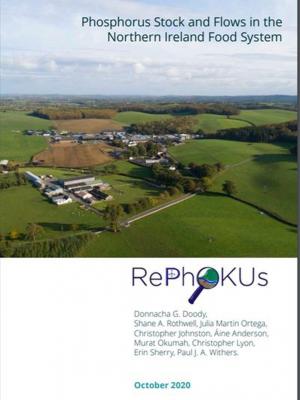The Agri-Food and Bioscience Institute have released a major new report on the future sustainable management of phosphorus (P) in Northern Ireland (NI).

The report highlights that in 2017 there was an excess of 10,300 tons of P in NI, above what is required for agricultural production. 7,300 tonnes of this P is accumulating in our soils on an annual basis, which is an economic loss for farmers and has the potential to impact on our water quality well into the future. In 2017 a total of 1,530 tonnes of P was lost to water, with 62% of this arising from agricultural sources.
Speaking at the launch of the report Dr Elizabeth Magowan commented “this report will contribute to better management of P as an economic resource for NI. The better we manage P, the more efficient our agricultural production will be, as well as protecting our rivers and lakes. A reduction in P imports to NI, will boost agricultural productivity and save money for farmers and deliver clean water for biodiversity, drinking and recreation, which are central to the wellbeing of our society. A key component of moving forward with the management of P will be to continue to work with our farmers to provide them with the tool and information required to improve P use efficiency”.
The report was a result of a 12 month process, carried out through the RePhoKUs project, which involved extensive engagement with agri-food, environmental and government organisations across NI. Stakeholders were involved in the co-development of a food systems model that was used to identify future scenarios for sustainable P management. These scenarios were then presented at a workshop held in February 2020, where stakeholders discussed the barriers and levers to transforming the food system so as to maximise agricultural production while minimising P losses to waterbodies.
Lead author on the report, Dr Donnacha Doody commented that “the involvement of people from the agri-food industry, NGOs and government was vital to the success of this work, providing valuable insights, solutions and knowledge to identifying realistic ways to transform P management in the NI food system”. To achieve the dual objectives of productive agriculture and clean water, stakeholders identified the need to minimise P imports into NI in fertiliser and animal feeds while also exploring opportunities for manure processing and development of new P fertiliser products for export. The report concludes that in order to improve the economic viability of manure management and export, a holistic approach needs to be taken, that accounts for its value; as a fertiliser, for carbon sequestration and for energy production.
Phosphorus is an essential nutrient for the future of the agri-food industry, however on a global scale it is a finite and scarce resource, with the vast majority of the known deposits located in Morocco and China. N. As such, agriculture is completely dependent on imports of P in fertiliser and feed to support food production in NI. Phosphorus is also a pressing environmental issue, as excessive inputs to lakes and rivers causes eutrophication which has a significant impact on biodiversity, drinking water quality and recreation. Currently 61% of our waterbodies are failing to meet water quality standards due to high levels of phosphorus in them.
The RePhoKUs project is a collaboration between AFBI, Lancaster University, Leeds University, University of Technology Sydney, and Centre for Ecology and Hydrology. The project is funded under the Global Food Security’s ‘Resilience of the UK Food System Programme’, which is a UK cross-government programme funded by the Biotechnology and Biological Science Research Council (BBSRC), the Economic and Social Research Council (ESRC), the Natural Environment Research Council (NERC) and the Scottish Government. The aim of RePhoKUs is to enhance the resilience and sustainability of the UK food system by developing and prioritising adaptive strategies that reduce the vulnerability of UK farming to future P scarcity at multiple scales, and that enhance the balanced delivery of multiple ecosystem systems for future food and water security.
More information on the project can be found at http://wp.lancs.ac.uk/rephokus/.
The report can be downloaded from https://www.afbini.gov.uk/publications/rephokus-report-oct-2020.
More information on the Global Food Security Programme can be found at https://www.foodsecurity.ac.uk/.
Notes to editors:
AFBI is an arms-length body of DAERA delivering research and development, diagnostic and analytical testing, emergency response capability and expert scientific advice for DAERA and other government departments, public bodies and commercial companies in Northern Ireland, and further afield.
AFBI’s Vision is “Advancing the Local and Global Agri-Food Sectors Through Scientific Excellence”.
AFBI’s core areas:
- Leading improvements in the agri-food industry;
- Protecting animal, plant and human health;
- Enhancing the natural and marine environment.
All enquiries to AFBI Press Office afbi.press-office@afbini.gov.uk
Latest news
- Resilience, Sustainability and Innovation survey 03 March 2025
- AFBI led Project Launched to Promote Sustainable Dairy Farming across the UK 18 February 2025
- UK Project Launched to Promote Sustainable Dairy Farming 11 February 2025
- International Day of Women and Girls in Science 11 February 2025
